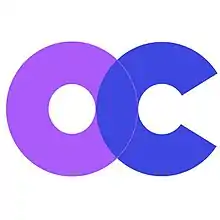OpenCitations
OpenCitations (established in 2010) [1][2] is a project aiming to publish open bibliographic citation information in RDF.[3] It produces the "OpenCitations Corpus" citation database in the process.[4]
 | |
| History | 2010-present |
|---|---|
| Access | |
| Cost | Free |
| Links | |
| Website | opencitations |
Datasets
OpenCitations publishes the following datasets which encompass bibliographic data, citation metadata, and in-text reference data. The datasets can be accessed via SPARQL, a REST API, as dumps on Figshare, as individual bibliographic entities, or using OSCAR (OpenCitations RDF Search Application) or Lucinda (The OpenCitations RDF Resource Browser). [5]
OpenCitations Corpus
The OpenCitations Corpus (OCC) is an open repository of scholarly citation data. The repository is released under the CC0 public domain to ensure that the scholarly citation data is open to all.[2]
As of March 19, 2022, the OCC has ingested the references from 326,743 citing bibliographic resources and contains information about 13,964,148 citation links to 7,565,367 cited resources. [4]
OpenCitations Indexes
The OpenCitations Indexes are collections of citations, which treat citations as first-class data objects that include citation metadata, as well as identifiers to the citing and cited works. [6] For example, COCI is the OpenCitations Index of Crossref open DOI-to-DOI citations. A 2021 comparison with other citations tools found that COCI was the smallest in coverage,[7] and a 2020 study found that 54% of the citation links in Web of Science were also in COCI.[8]
Open Biomedical Citations in Context Corpus
The Open Biomedical Citations in Context Corpus (CCC) is a database of citations providing in-text references,[9] extending OpenCitations records with in-text reference pointer information.
See also
References
- "OpenCitations - About". opencitations.net. Retrieved 2019-05-28.
- Peroni, Silvio; Shotton, David; Vitali, Fabio (2017). "One year of the OpenCitations Corpus: Releasing RDF-based scholarly citation data into the Public Domain". Proceedings of the 16th International Semantic Web Conference (ISWC 2017). 184 (192). doi:10.1007/978-3-319-68204-4_19. Retrieved 2019-05-28.
- Silvio Peroni; David Shotton (February 2020). "OpenCitations, an infrastructure organization for open scholarship". Quantitative Science Studies. 1 (1): 428–444. arXiv:1906.11964. doi:10.1162/QSS_A_00023. ISSN 2641-3337. Wikidata Q86246929.
- David Shotton (January 29, 2018), OpenCitations and the Initiative for Open Citations: A Clarification
- Chiara Di Giambattista (2022-09-02). "OpenCitations Access Tokens: how they work and why they are important". opencitations.hypothesis.org. Retrieved 2022-11-05.
- David Shotton, Citations as First-Class Data Entities: Introduction, retrieved 2022-11-05
- Martín-Martín, Alberto; Thelwall, Mike; Orduna-Malea, Enrique; Delgado López-Cózar, Emilio (January 2021). "Google Scholar, Microsoft Academic, Scopus, Dimensions, Web of Science, and OpenCitations' COCI: a multidisciplinary comparison of coverage via citations". Scientometrics. 126 (1): 871–906. doi:10.1007/s11192-020-03690-4.
- Chudlarský, Tomáš; Dvořák, Jan (1 November 2020). "Can Crossref Citations Replace Web of Science for Research Evaluation? The Share of Open Citations". Journal of Data and Information Science. 5 (4): 35–42. doi:10.2478/jdis-2020-0037.
- "Open Biomedical Citations in Context Corpus". wellcome.org. Retrieved 2022-11-05.
External links
- Official website
- "(OpenCitations Corpus)". Open Access Tracking Project. Harvard University. OCLC 1040261573.